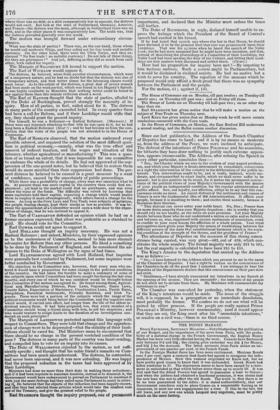Since our last publication, the Address of the French Chamber
of Deputies has come to hand ; and it is by no means so moderate as, from the address of the Peers, we were inclined to anticipate. The distrust of the intentions of Prince POLIGNAC and his associates, for hitherto they have done nothing to justify such extreme opposi- tion, appears irremoveable. The Address, after echoing the Speech in every other particular, concludes thus :— " Sire, the Charter which we owe to the wisdom of your august predeces- sor, and which your Majesty is firmly determined to consolidate, consecrates as a right the intervention of the country in the deliberation of the public in- terests. This intervention ought to be, and is really, indirect, wisely mo- derate, and circumscribed to exact limits, which we shall never suffer to be passed; but is also positive in its result, for it makes the permanent concur- rence of the political views of your Majesty's Government with the desires of your people an indispensable condition for the regular administration of public affairs. Sire, our loyalty, our affection, oblige us to say that this con- currence exists no more. An unjust distrust of the sentiments and reason of France is now the fundamental idea of thb Administration. It afflicts your people, because it is insulting to them; and excites their anxiety, because it threatens their liberties.
"This distrust can never enter your noble heart. No, Sire; France does no more desire anarchy than your Majesty despotism : she is worthy that you should rely on her loyalty, as she relies on your promises. Let your Majesty decide between those who do not understand a nation so calm and so faithful, and between us, who, impressed with sincere sentiments of conviction, come to confide to your royal bosom the affliction of a whole nation. Your royal prerogatives have given your Majesty the means of establishing between the different powers of the state that constitutional harmony which is the essen- tial condition of the strength of the throne, and the grandeur of France."
The attendance of Deputies on the occasion of this strong remon strance being carried, was very great-402, out of 430, which con- stitutes the whole number. The formal majority was only 221 to 181, but the real majority is calculated to have been 251 to 151. The King's Answer to the deputation that carried up the Address was as follows :— " Sir,—I have listened to the Address which you present to me in the name of the Chamber of Deputies. I had a right to reckon on the concurrence of the Chambers to do all the good that I intended. I am unhappy to hear the Deputies of the Departments declare that this concurrence on their part does not exist.
"Gentlemen,—.I have already announced my intentions in my Speech at the opening of the session. They are immutable ; the interests of my people do not allow me to deviate from them. My Ministers will communicate my intentions to you."
The Chamber was convoked for yesterday, when the statement of the King's intentions would be made. The issue of the struggle will, it is supposed, be a prorogation or an immediate dissolution, most probably the former. We confess we do not see what will be gained by either process. If the people are really against Prince POLIGNAC'S Ministry, however unreasonably, (and it would appear that they are so), the King must alter his 41 immutable intentions," or resolve on a civil war,--there is no third course.


















 Previous page
Previous page